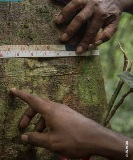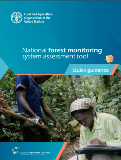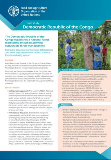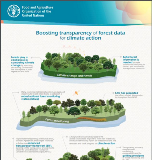Publications

Renforcer les capacités mondiales pour accroître la transparence dans le secteur forestier
2023
Renforcer les capacités mondiales pour accroître la transparence dans le secteur forestier (CBIT-Forest) : accélérer le renforcement des capacités, le partage des connaissances et la sensibilisation est un projet ambitieux dirigé par l’Organisation des Nations Unies pour l’alimentation et l’agriculture (FAO), conçu pour accélérer les efforts de renforcement des capacités, de partage des connaissances et de sensibilisation dans les pays en développement.

Vers des données sur les forêts ouvertes et transparentes pour l’action climatique : Expériences et leçons apprises
2022
«Renforcer les capacités mondiales pour accroître la transparence dans le secteur forestier (CBIT-Forest)» est un projet mené par l’Organisation des Nations Unies pour l’alimentation et l’agriculture (FAO) et financé par le fonds fiduciaire Initiative de renforcement des capacités en matière de transparence (CBIT) du Fonds pour l’environnement mondial (FEM), qui a duré deux ans et demi. Ce projet mondial a renforcé les capacités institutionnelles et techniques des pays en développement.

Le système national de suivi des forêts fournit de meilleures données et renforce les capacités en Papouasie-Nouvelle-Guinée
2021
En collaboration avec le Costa Rica, la Papouasie-Nouvelle-Guinée a proposé le concept de réduction des émissions dues à la déforestation et à la dégradation des forêts (REDD+) à la Convention-cadre des Nations Unies sur les changements climatiques (CCNUCC) en 2005. Depuis lors, le pays a continué à se préparer à la REDD+ et a travaillé à l'établissement d'un système national de surveillance des forêts (SNSF). Ces actions sont vitales, car des informations précises sur...

Établissement d’un système national de suivi des forêts polyvalent pour améliorer les capacités de suivi de l’utilisation des terres au Ghana
2021
Depuis 2008, la République du Ghana a mis en œuvre des activités de réduction des émissions liées à la déforestation et à la dégradation des forêts (REDD+). Ces actions comprennent la mise en place d'un système national de suivi des forêts (SNSF) polyvalent pour améliorer les capacités de surveillance de l'utilisation des terres dans le pays. Le développement du SNSF du Ghana renforce l'accessibilité et l'exactitude des données forestières pour atteindre les objectifs climatiques...

Le Système national de suivi des forêts dans la Stratégie nationale sur le changement climatique et les ressources végétales au Chili
2021
Cette étude de cas du Chili applique des approches de suivi de pointe pour la conservation, la restauration et la gestion des forêts. Elle offre un aperçu des efforts consentis par le Chili pour réduire les émissions dues à la déforestation et à la dégradation des forêts et pour améliorer les stocks de carbone forestier (REDD+).

Institutionnalisation des données sur les forêts Établir des cadres juridiques pour le suivi durable des forêts dans les pays REDD+
2021
Des efforts ont aussi été déployés pour institutionnaliser le nationaux de suivi des forêts (SNSF), afin de renforcer l’appropriation nationale de l’architecture REDD+ dans son ensemble, essentielle à sa durabilité, et pour ouvrir la voie à une utilisation plus rationnelle des données sur les forêts, du partage de données et de la transparence.

Note d’information: Évaluation juridique pour la mise en place et l’opérationnalisation d’un système national de suivi des forêts
2021
Les pays ont fait des progrès substantiels dans la mise au point et l’opérationnalisation de leurs systèmes nationaux de suivi des forêts (SNSF), pour respecter le cadre de mesure, notification et vérification (MNV) en ligne avec la Convention-cadre des Nations Unies sur les changements climatiques (CCNUCC), ainsi que pour fournir de meilleures données sur les forêts pour appuyer efficacement la prise de décisions et les politiques nationales. Les efforts de mise au point des...

Étude de cas: Bangladesh - Un système national de suivi des forêts intégré pour une gestion et une conservation des forêts durables au Bangladesh
2020
Le Bangladesh est très vulnérable aux impacts du changement climatique. Pour appuyer et améliorer la prise de décisions relative à l’atténuation et l’adaptation au changement climatique, l’accès à des données et informations solides est essentiel. Le rôle du secteur forestier et la disponibilité de données sur les forêts exhaustives appuient la planification, la mise en œuvre et le suivi à long terme d’activités relatives aux forêts qui servent des objectifs multiples.

Outil d’évaluation du système national de suivi des forêts: Guide rapide
2020
L’outil d’évaluation du système de suivi national des forêts (SSNF) a été conçu dans le cadre du projet “Renforcer les capacités mondiales pour accroître la transparence dans le secteur forestier (CBIT-Forest)” mis en œuvre par l’Organisation des Nations Unies pour l’alimentation et l’agriculture (FAO) et financé par le fonds fiduciaire Initiative de renforcement des capacités en matière de transparence (CBIT) du Fonds pour l’environnement mondial (FEM).

Étude de cas République démocratique du Congo: La République démocratique du Congo établit un système de suivi national des forêts pour promouvoir la gestion durable des forêts
2020
En République démocratique du Congo, un pays d’Afrique centrale, réduire les émissions provenant de la déforestation et de la dégradation des forêts est une priorité stratégique nationale. La République démocratique du Congo disposait précédemment de capacités techniques limitées pour produire les outils nécessaires au suivi de la couverture forestière et de ses changements et pour prendre des décisions politiques informées relatives à...

Outil d’évaluation du système national de suivi des forêts (SNSF) - Note d’information
2020
Un manque de capacités institutionnelles et individuelles affaiblit souvent l’impact à long terme de programmes néanmoins techniquement solides. Pour appuyer les efforts vers un suivi des forêts solide et efficace, l’Organisation des Nations Unies pour l’alimentation et l’agriculture (FAO) a développé un outil d’évaluation du système national de suivi des forêts (SNSF) afin d’aider les pays à identifier les lacunes et faiblesses en termes de capacités et...

Renforcer la transparence des données relatives aux forêts pour l’action climatique
2020
Les forêts jouent un rôle essentiel dans la lutte contre le changement climatique en absorbant et stockant le carbone de l’atmosphère dans leur végétation et dans les sols

Note d’information: Renforcer les systèmes de suivi national des forêts grâce à une évaluation intégrale des besoins en capacités
2020
Un manque de capacités institutionnelles et individuelles affaiblit souvent l’impact à long terme de programmes néanmoins techniquement solides. Pour appuyer les efforts vers un suivi des forêts solide et efficace, l’Organisation des Nations Unies pour l’alimentation et l’agriculture (FAO) a développé un instrument d’évaluation du Système de suivi national des...

Étude de cas Costa Rica: Progrès du Costa Rica dans le développement d’un système national de suivi de l’utilisation et l’occupation des terres et des écosystèmes
2020
La République du Costa Rica est un pays d’Amérique centrale largement couvert de forêt tropicale présentant une biodiversité importante. Le pays déploie de nombreux efforts pour conserver ses forêts et sa biodiversité, même si dans la plupart des cas les ressources forestières et agricoles ont été évaluées indépendamment.

Renforcer les capacités mondiales pour accroître la transparence dans le secteur forestier (CBIT-Forest)
2020
«Renforcer les capacités mondiales pour accroître la transparence dans le secteur forestier (CBIT-Forest)» est un projet biennal de l’Organisation pour l’alimentation et l’agriculture (FAO) financé par l’Initiative de Renforcement des Capacités pour la Transparence (CBIT, en anglais), qui est un fonds d’affectation du Fonds pour l’Environnement Mondial (FEM). Ce projet mondial renforcera les capacités institutionnelles et techniques des pays en développement ...

Directives volontaires sur le suivi des forêts
2020
L’objectif de ces Directives volontaires est d’aider à la création et à l’exploitation des SSNF. Elles offrent des principes de bonne pratique, des directives et un cadre général. Elles intègrent également une série d’outils d’aide à la décision pour la planification et la mise en œuvre de SSNF à objectifs multiples, adaptés aux pays, fondés sur la science et tenant compte des besoins nationaux en matière d’information et d’établissement de rapports.
